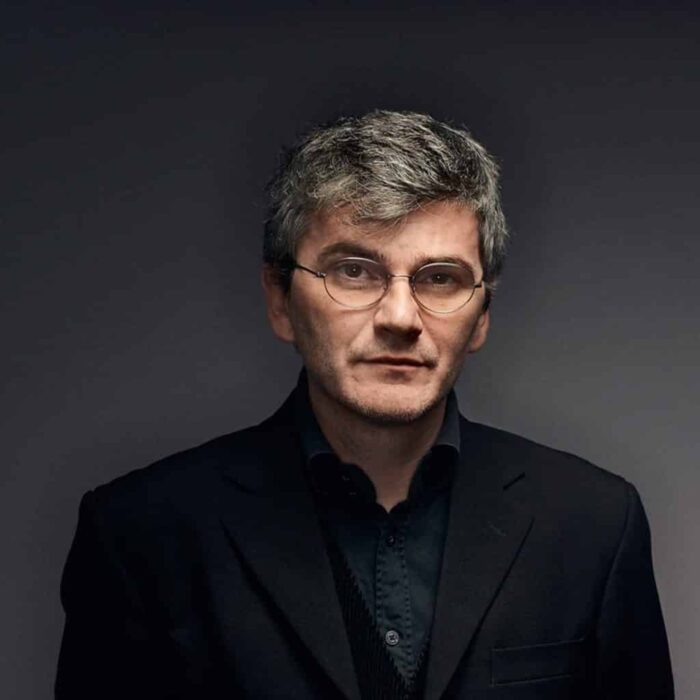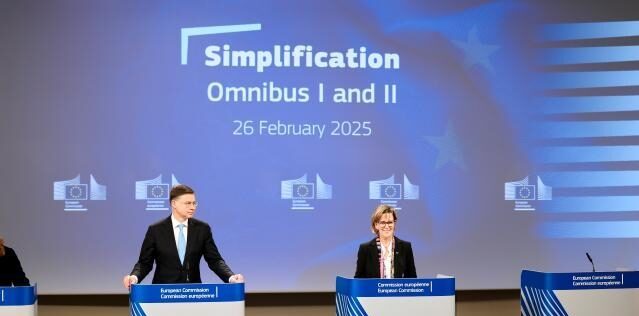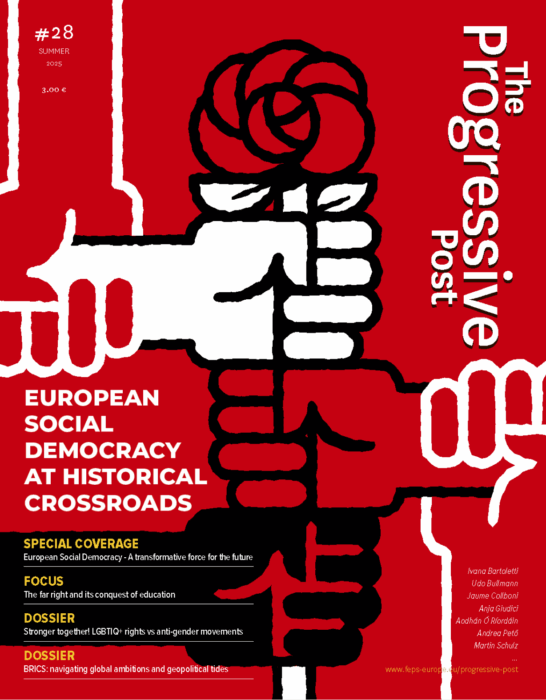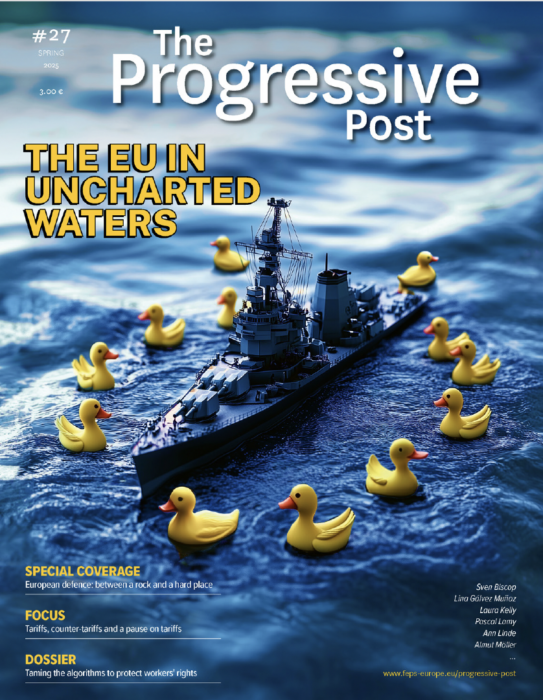The Progressive Post
2007 – 2017: Ten years of "marino-lepen-ism"
Read the original text in French here
To truly understand the determination and drive which carries Marine Le Pen and analyse her electoral program one must first consider the 2012 presidential election before reviewing the present election. There are clear similarities between the present 2017 presidential program and the ‘strategy’ she employed for her father in 2007: both share the belief that one must fight strongly for the National Front (FN).
In 2007, Jean-Marie Le Pen felt confident about the presidential elections. He believed he would be able to repeat his achievement from 21 April 2002 and that he would succeed once more. This firm belief and resolute desire to achieve are embedded within Marine Le Pen. She started in politics during the in-party war involving Bruno Mégret and first appeared in public in 2002 [[See David Doucet and Mathieu Dejean, Politics in spite of her (La Politique malgré elle), Paris, La Tengo, 2017.]]. This represents the first time that she has really been in control of policy. The electoral campaign is controlled through a partnership; Marine Le Pen retains the “strategic” control, whilst Bruno Gollnisch possesses the “operational” control. The difficult challenge of collecting five hundred signatures falls to the “coordinator” Louis Aliot, whilst Jean-Claude Martinez is “special adviser in charge of strategic foresight”. Working groups are then added to this unknown organisational structure. As a group they fail to reach the first round. The latter was not obtainable. Jean-Marie Le Pen records a relatively poor performance (with only 10.44% of the vote).
In 2017, Marine Le Pen has been reported to be one of the favourites to reach the first round, but she remains somewhat of an underdog to progress to the second round. This being said, the gap between Le Pen and her competitors is smaller than the gap between her predecessor and President Jacques Chirac. To better understand the motivation behind Le Pen we must refer to the 2012 election in order to assess her success during 2017. When considering the National Front as a political party it is important to compare the 2007 program with the 2017 program. From her past to her un-losable campaign, from “Marine Le Pen” in training to “Marine” the validated, how did she successfully reorganise the Front and what they offer the voter?
Preliminary considerations: organisation of the electoral offering
Both electoral programs are preceded by an introductory statement from the respective candidate; Marine Le Pen’s father in 2007 and her own in 2017. The 2007 statement opens with a rhetoric which focuses on the “totalitarian yoke beneath a democratic façade”, and contextualises the nationalist struggle by referring to the struggles of the twentieth century, from their struggle against communism to the decolonisation wars. The goal is stated as the “liberation of France”, a country which is a “millennial civilization” whose national framework would be “as indispensable to life as the sheathing of a wooden boat: the rampart if you will against the threatening waves and the hull that contains all the hopes of the passengers contained within”.
Two specific measures are mentioned in this opening statement: “the return of all immigrants to their country of origin, ensuring dignity and respect for persons throughout. Innocent human life, from its origin to its natural end shall be protected and the family unit will be respected”.
In 2017 however, Le Pen makes no reference to the past or the history; she discusses the subject free from lyricism and the past. The watchword is “to restore France to order in five years”, which in effect repeats the conventional notion that the extreme right may be the only party capable of restoring order to society, however this concept if perpetuated would be disturbing to some. Marine Le Pen integrates this concept and carefully stresses that it is not a question of establishing a new movement but moreover assuming an eligible function. The statement also furthers this point by specifying: “My project, you will see, consists of a veritable revolution of proximity”; this is not the collective adventure of a nationalist party, but a single individual who refuses to accept the theme of proximity on a democratic and economic level. Notwithstanding this the liberation of France is still referred to, as are the common unitarian themes and the contrasting positions of patriots and globalists; but if the vision of the world is the same as in 2007, then her father’s vision for the future has been passed through a sieve in the name of appeasing the masses.
The statement has been prepared with a more formal tone: the text signed by Marine Le Pen in 2017 has been carefully adapted to the readership of today. The lexical register is also tighter than before, the reader is not required to possess any prior-knowledge and the text is only a short document. In general terms, the manner in which Le Pen has presented the program reflects her willingness to adapt to public demand. Contrastingly, the 2007 program opens each chapter with a lengthy ideological analysis supplemented by numerous references. Marine Le Pen is also able to retain a certain degree of lyricism thanks to the rhetorical use of inverse antonomasia (for example: “There is, in fact, in the continuance of civilization and people, a pre-established harmony, a reflection of the moment of Creation, which the Greeks called the Cosmos, which signifies the established Order”) before she moves on to the policies that relate to establishing order from the chaos. Such holistic and naturalist concepts are asserted by Le Pen allowing her to establish the concept of a “natural order” to which man must align himself.
The 2017 program does not concern itself with any doctrinal aspects and instead favours a more direct style (each measure is introduced by a verb in the infinitive and is numbered for easy reading). The program also does not discuss any philosophical developments and moves straight onto what the party can offer to the public – thought this does not mean that it is less consistent ideologically speaking. The doctrinal framework is founded upon the borders of the country: in 2007 France was a part of history, ten years into the future and it is now associated more closely with geography.
The general order
The two documents outline how to liberate France. The 2007 program contains the following: the first issue to be considered is demographic and moral: it outlines the need to repeal abortion laws and PACS, introduce academic rebates and to insert a “right to life” into the Constitution. These social measures are predicted to encourage the birth rate: whilst increasing parental income and housing loan availability in particular. The 2017 program does not open in the same way and indeed contains no references to family and prefers biological rights: it is sovereignty that liberates and is integral to all other issues (“monetary, legislative, territorial, economic”). As a result, the program includes support for pro-life policies (which crucially no longer implies the need to prohibit abortion) is displaced as a theme and integrated into a broader social question (including the granting of un-weighted family allowances to those with higher earnings presented to the voter as “universality.”) Unlike in 2007 there is no focus on the biological shock associated with immigration and the decline of a Nation. As for the difficult question regarding same sex marriages, it is dealt with between the revaluation of the index point for the civil service and financial assistance to the handicapped, which in some respects appears to be a Solomonic judgment between the different tendencies: repeal of the Taubira Act without retroactive effect to form an “enhanced PACS”. Societal issues are treated as aspects of social issues and not as determining factors in a given political debate.
The central concept is no longer the shock to the demographic, but moreover about regaining sovereignty. This is as nationalist as it is populist with a referendum being demanded by many along with the adoption of proportional representation and the notion of proximity. These are long-standing principles of the National Front, the concept that the Sixth Republic was of fundamental importance to Jean-Marie Le Pen in the 1988 presidential campaign, and that the Republic referendum was at the heart of their 2002 campaign. Similarly, the notion of a “Plebiscite Republic” was at the heart of national populism since the 19th century: in this material respect, all generations of the Le Pen family form part of the extreme right (see Grégoire Kauffman, The New NF. The old clothes of populism, Paris, Seuil, 2016).]]. Similarly, one can consider the notion of freedom of choice for public or private school enrolments, but this is integrated not with the pro-life rhetoric, but on the page titled “To remake France a country of liberties”. The same applies to the conventional national-populist demand for “freedom of association” as a means to replace the current system of representation, which in 2007 was included in the chapter titled “Social: Uniting the French”. In the 2017 program, the perspective is neo-populist since these passages have been amalgamated with the defence of digital freedoms (with a global license) or those of women against Islamism.
Complete sovereignty remains a concern for both neo-populism and national-populism; voters often fleeing from extreme right-wing regimes to propose extreme right-wing governance. The replacement of the slogan “Reassured France”, chosen in 2016, to the one which reads “To restore France to order in five years” which is suitable and adequate.
The security order
Adapted to the target audience, the 2017 program opens directly with the issue of security, whereas this theme only appeared in the latter half of the 2007 program (as a result of the subject being an issue in the 2002 election, in March 2007 National Front voters in France believed that Nicolas Sarkozy was “the most able candidate to guarantee the security of people and property.” [[Jérôme Fourquet, Jean-Marie Le Pen’s failure in the 2007 presidential election: causes for the haemorrhage, Cevipof, May 2007.]].
The document does not refer to ethnic gangs any more than in the 2007 program, but it does include the intent to “target the 5,000 gang leaders and criminals identified by the Interior Ministry” – the report on the gang phenomenon produced by the Interior on 19th January 2012 actually listed 313 different gangs [[Le Figaro, 23 February 2012.]]. Both programs express a desire to automatically expel any and all foreign nationals sentenced by the police and the creation of new holding prisons to achieve this aim (13,000 places in 2007 and 40,000 in 2017). Neither program explicitly states the legal difficulties which would be encountered if this were implemented, but it is true that today’s National Front supporters may consider using new arguments against the European Union (according to the case law of the European Court of Human Rights). The referral to the ECHR must be related and proportional to the individual case and the decision must take account of family relations in the country of residence, and in the case of a European national, referral may only be made in cases where there is a serious threat to public order) [[With regard to the reinstatement of the death penalty (not present in the 2017 program), the 2007 program specifies that France should denounce the European treaties.]].
Both programs raise the issue of immigration in terms of the risk it poses to national security. The 2007 program intended to deport all illegals and place a complete ban on immigration before introducing “reverse migration”. Ten years later, the project provides the following goal “net migration of 10,000.” This goal was stated by Florian Philippot on a television set during 2015, who confirmed that this was the National Front’s program, while the latter planned for 10,000 admissions rather than a balance of 10,000. Whether it was a slip of the tongue or a direct re-write of the program is of little importance: it was made through conventional means but left unclear, as evidenced by the confusion of the coordinator for the 2017 project who remained uncertain whether or not to count immigrants or foreign nationals [[Liberation, 5 November 2015; Id., 8 February 2017.]]. If the right of blood is always privileged over the right of birthplace, then the abolition of dual nationality is now limited to non-European nationalities only.
The issue of the fight against Islam has become crucial to the Frontist program, and is detailed at length from the perspective of the foreign nationals. The expulsion of foreign nationals could however lead to national indignity for the French if it were to be implemented improperly. These measures have the tremendous advantage of satisfying a broad number of supporters; the neo-populist supporters could provide symbolic investment in terms of the anti-totalitarian republican area as national indignity was first conceived and used against collaborators and collaborationists. This is important as the National Front was largely founded by militants who were fired for their radicalism during the Algerian War. Similarly, the dissolution of “organisations of all kinds which have a connection to Islamist fundamentalists” is called for. One can imagine that this is a proposal for extensive use of law of 20 November 2015 which amended the provisions of the Internal Security Code which itself was formed from the law of 10 January 1936. Since the latter was implemented to control extremist right-wing leagues, and is still in the public consciousness as such, all these security provisions seem well positioned to signify that the National Front could defend the republican order against an extremist threat, a process which if completed would satisfy authoritarian demand and ‘plough the furrow’ for the so-called “de-demonisation” strategy.
The economic order
The 2017 document focuses predominantly on economic and social issues. The program illustrates how important the issue is to National Front voters as well as highlighting effectively the differences between the right-wing program and the left-wing program.
Formerly a cornerstone of the social program, national preference (or bias) now only appears as one of the measures for “economic patriotism.” The features detailed in the program have also been reduced: whilst works are undertaken on this policy [[Jean-Yves Le Gallou and the Club de l’Horloge, The national preference. Response to immigration, Paris, Albin Michel, 1985.]] proposed that an undertaking could request French nationality for employees or that they could lay off foreign workers first ahead of non-foreign nationals, this remains the priority in terms of allocation of social housing and the additional taxation revenue from foreign employees / workers – the discriminatory powers are much less than those referred to in the 1932 and 1935 legislation which led to the 345,000 foreigners leaving France since 1931. [[Jeanne Singer-Kerel, “Protection” of the national workforce in times of crisis” European Journal of International Migration, vol. 5, n°2, 1989, pp. 7-27.]]. However, it seems increasingly difficult to circumvent implementation of some form of national preference as part of these measures.
Indeed, the chapter devoted to the rejuvenation of the country’s identity provides for the inclusion in the Constitution of a “national priority” clause, which mirrors the 2007 program and opens a much wider area than that of the aforementioned employee taxation. This would naturally require various constitutional formalities to be completed and applied before the constitutional transformation could take effect. In order to advocate implementation would be to reduce the phenomenon to a smaller change than is required in reality, that is, the trade-off between ideological assertion and a reassuring mezza voce. Nevertheless, this very unique character demonstrates to what extent the mechanical discourse regarding an economic program prepared by the National Front shifting to the left is either polemic or misunderstood: it is always what the British historian Roger Griffin called an “Ethnocratic liberalism”, which one can more simply call in French an “ethno-liberalism” [[Roger Griffin, “Interregnum or Endgame? Radical right thought in the “post-fascist” era”, The Journal of political ideologies, vol. 5, n°2, 2000, pp. 163-178.]].
This is why, in an approach which utilises organic unification and not class opposition, the crux of the argument is tied to the concept of protectionism. Free trade agreements are rejected as a whole. The public agro-food commission for the State and local authorities should be restricted to French companies. It is also about “developing short cuts from production to consumption, reorganising sectors”, an eco-localist theme was introduced to the extreme right by ‘Identitaires’ and has now been assumed by the National Front. On the other hand, there is no such promise in the 2007 program to introduce a 0% VAT in support of organic farming. The food market is considered to be outside the usual commercial negotiations and Marine Le Pen intends to close national borders to “agricultural and food products that do not comply with French production standards in terms of safety, animal welfare and the environment” whilst “promoting agricultural exports, in particular by offering support to quality assurance labels”.
SMEs are particularly favoured and there are suggestions for close ties to merchants and artisans: restricted markets, administrative simplifications and a redesign of the RSI. Beyond the pure economic aspects, Marine Le Pen’s work in this important sector has been reflected amongst self-employed voters: during the last presidential elections, 22% in 2002, 9% in 2007, 17% in 2012. A combination of what Nicolas Sarkozy has termed the “labour value” and the intrinsic inter-classism of the extreme right is now bearing fruit: 40% of artisans voted for the National Front in the regional elections of 2015. The so-called right-wing cultural values and the left-wing social values are now at stake: the desire for social order is expressed through a legitimate hierarchy, where the decried worker does not have the same level of profit as a capitalist within an oligarchy, and below them all the immigrants who are supposed to enjoy all the state benefits.
These are known organisational factors from nationalist populism and cannot be attributed to Marine Le Pen. The difference between the models is the emphasis placed on social-interventionist measures implemented by the state. This is caused by Marine Le Pen’s conviction that the people are isolated from liberalism since the financial crisis of 2008, and the difference in strategic approaches. According to her father, “my daughter expresses some consideration of the left-wing components of the National Front voters. Marine on the other hand tells her father that this is incorrect because they are no longer left-wing ideals. If they were left, they would remain on the left. If they are supporters of the National Front, it is because they are no longer on the left.” [[Jean-Marie Le Pen with Robert Ménard and Emmanuel Duverger, Antimémoires, Paris, Jacob-Duvernet, 2013, p. 100 (unedited, personal archives).]]. The political approach still favoured by the honorary president is therefore one that allows them to construct an autonomous block, when the president has a very interactionist conception of politics – which implies a greater capacity for adaptability for the possibility of two terms in office.
The continuing link between national sovereignty and social protection has the advantage of offering coherence and clarity, whereas in 2007 the party was drawn into last minute dash for support and attempting to make voters move, Jean-Claude Martinez is calling for the party to rid themselves of their obsession with immigration and to address the shift to the left by renaming the party “Alter-national Front”, while Alain Soral proclaimed that “if Marx were alive, he would call on us to vote Le Pen”.
Specific social measures do exist (repeal of the El Khomri law, revaluation of pensions, facilitated donations, retirement at 60, reduction of borrowing and premium rates, etc.), which frankly differentiate Marine Le Pen from Francois Fillon and his father’s policies, but care must be taken first to commit State funds and not those of private business – there is thus no revaluation of the SMIC, which may be appropriate for a private sector employee at the heart of the electorate in question, but displeasing to management of SMEs.
Their insistence on an expanded social security program shows that the National Front hopes that Francois Fillon’s program in this area can help him fill his own shortcomings in the social sector particular for pensioners (moderate voters who may be at the same time abstentionist and less Frontist). Their defence of the health system is also skilfully prepared as the response deals with the question of regional planning (fight against medical ‘wasteland’, defence of the nearby public hospital) in order to create a unified and protected framework. In this respect, the National Front has obviously been much more receptive than its competitors to the lessons from previous attempts and listened to commentators and analysts alike; such as those from the Research Centre for Political Radicalism, who linked land development plans to the National Front vote in 2015: defending public enterprises and services provided by public authorities in all neighbouring countries with the aim “to consolidate land development plans, transport and housing into a single ministry. Rebalancing the city’s policies towards deserted and rural areas “(the National Front having excelled in recent years in competing in the “suburbs” and “forgotten France”).
If taxation is supposed to be able to be restrained, and the taxes drop as promised, it is usually because the economy considers it is acceptable taking into account the cost of immigration. But the National Front here avoids stating any figures. In 2007, they affirmed that immigration costs 209 billion francs (conversion into EUR not available). In 2012, Le Pen announced that immigration cost 40 billion EUR, a figure that increased to 70 billion in 2014 and 100 billion in 2015, but the General Secretary Nicolas Bay has since lowered this figure to somewhere between 25-60,000,000,000 at National Front University Summer Camp 2016. The lack of precision in relation to the above figures allows us to sidestep the merits and relevance of the calculation announced, especially since the idea remains: the welfare state is feasible without a tax increase if he is defeated by the burden of immigration issues.
The identity-based order
The concept that the party is “against immigration” is now principally formulated in positive terms, “for the purposes of identification”. The same theme runs throughout the program, without having to be consistently seen by the public as such: the prohibition against “slaughter without prior stunning” is evoked rather than openly discussed as ritual slaughter and this forms the “environmental” element, between “ensuring animal protection is a national priority” and “rejecting factory-type farms, the same farms that have 1,000 cows”.
The inclusion of a national bias in the Constitution is complemented by the principle that “The Republic does not recognise any community”, before adding: “To restore secularism everywhere, and extend the concept to all areas of public life and include the same in the Labour Code”. The concept of restoration is used in the sense of consecutive extensions, since the idea of normalising forms of religious expression by prohibition is far removed from the original concept – separation of the church and State, e.g. wearing of a Muslim veil in public areas, The National Front benefits from such controversies as those which surround the wearing of the veil at a university or wearing a burkini. Similarly, the proposal to “Strengthen the unity of the nation through the promotion of a roman national and the rejection of State repentance which can be divisive” certainly speaks to those on the extreme right from the inter-war period who remain concerned about our national identity, or to those who wish to rewrite the history textbooks as created by Bruno Mégret in 1982, but this amplifies all other recent controversies which exist outside the extreme right.
The 2007 solutions focus on issues relating to the termination of any teachers who are deemed to be indoctrinating students and the dismantling of school bureaucracy which is deemed surplus to requirements (no more than the imposition of the only syllabic methodology hitherto predicted by Marine Le Pen). This passage is the first section in the program to include a reference yet notably avoids making any historical references to academics or teaching methods. The author referenced is Jean Zay, the Minister of National Education for the People’s Front who was assassinated by militia members and pantheonized by President François Hollande. The figure is not widely known amongst the general public, but more widely appreciated in secular circles: it is simply a matter of amplifying the momentum and drive already under way, because if 3.8% of secondary school teachers voted for the National Front in 2012, there were arguably 9.4% available to vote the same way in 2015. [[Luc Rouban, “Civil servants and the National Front”, The French Electoral Survey: understanding 2017, note 3, round 1, Cevipof, December 2015.]].
Whilst uniforms are adopted for schools, the instruments that structure the inequality within the French school system are preserved (“Defending the French higher education model requires that all universities and prestigious universities mutually support each other”): it is a means to reinforce the social order, not to fracture or re-start the social elevator. Nevertheless, there is also an original proposal: “Launch a major nationwide plan to create fine-craftwork courses (high schools, universities) in French territories and establish a network of artist workshops throughout the territory”. This measure is in direct response to the present crisis currently being experienced by regional art schools and the establishment of the National Front at local election level in 2014 and 2015.
As a result the unitary-authoritarian theme provides an overall framework for all of the proposals and enables an emphasis to be placed on identity indirectly at the very least. Regarding the Lepenist vote, the lack of clarity on the above issues has been deemed by many leading party executives to represent the reason why the party failed in 2007. The 2006 poster which included a “young woman” showing her thong over her jeans has previously been defended by Marine Le Pen as being “perfectly consistent with the message of the National Front over the last thirty years” [Cf. Alexandre Dézé, The National Front and the conquest for power? Paris, Armand Colin, 2012, pp. 138-139. If Marine Le Pen’s defence is difficult to understand it is worth noting that this visual can be compared to the statements made by Samuel Maréchal in 1999 that France was now a multi-denominational reality. Maréchal asserted the above and confirmed that France and the party were both secular. Furthermore, he asserted that the National Front did not differentiate between Frenchmen according to their origins.]] but had confused said message – this promotion of France as a multi-ethnic group was under-appreciated by Philippe Olivier, the brother-in-law of Marine Le Pen who was entrusted with propaganda and promotional materials for Le Pen in 2016. Going beyond this poster, the speech made by Jean-Marie Le Pen on the slab of Argenteuil, where Nicolas Sarkozy was jeered and created a scandal in 2005 by speaking of the voters as “the rabble”, appeared counter-productive. The president of the National Front had attended the site and said: “if some people want to pressure you to exclude yourself or another, we want to help you get out of these suburban ghettos where the French politicians have placed you and called you a rabble thereafter.” It is a rare fact in politics: this response was judged so dispensable that all executives remain – Alain Soral himself denies being the author or the motivation behind the response.
At the same time as the social-interventionist angle deepened, the potential excesses relating to de-demonisation have been eliminated. In short, the 2017 campaign seeks to avoid both the trap of radicalism and the trap of banality. It can be stated as a fact: that as Jean-Marie Le Pen and the National Front was advancing despite their mistakes, Marine Le Pen now has the ability to achieve greater success from the mistakes of others.








